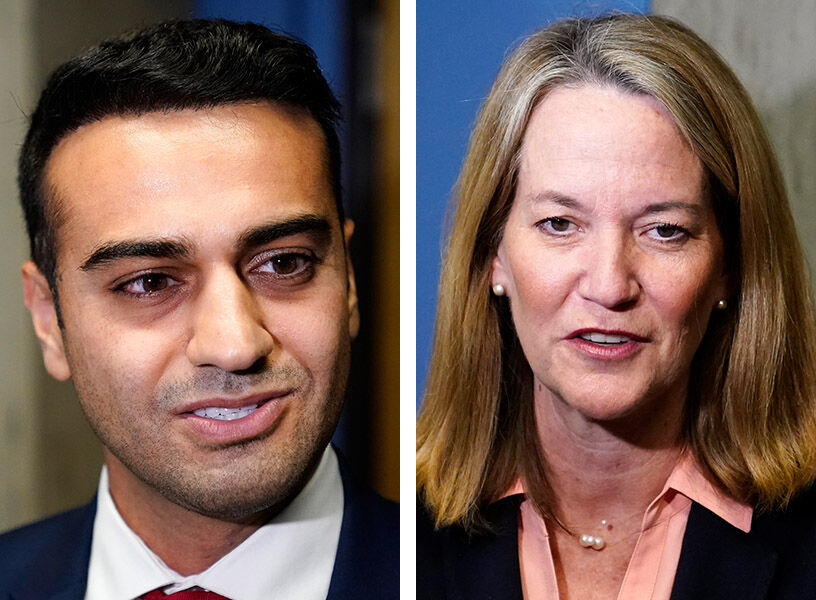PHOENIX — A bid by Abe Hamadeh to have a judge declare him Arizona’s next attorney general is “based on little more than speculation and conjecture,’’ an attorney for his Democratic foe is saying.
The Republican contender is basing at least part of his claim on the problems at some Maricopa County vote centers where on-site tabulators failed to properly process ballots, said Dan Barr, the attorney for Kris Mayes.
Hamadeh’s lawyer said those issues resulted in some people being denied the right to vote, something material given that the certified results show Mayes won the race by 511 votes.
But Barr said that, at best, Hamadeh is alleging “honest mistakes’’ and “mere omissions’’ by election workers who did not follow procedures to ensure that voters who left a first polling place could cast a ballot at another one. He said that state law requires proof of “actual misconduct.’’
“Plaintiffs admit that there was no fraud, manipulation, or other intentional wrongdoing that would impugn the outcomes of the election,’’ Barr told Mohave County Superior Court Judge Lee Jantzen.
And even if all the 395 voters who Hamadeh identifies as not having their ballots counted actually voted for him — something that not even the candidate is claiming — he still wouldn’t have enough votes to close the gap.
The new court filing in the legal fight in the race for attorney general comes as Jantzen first has to decide whether to even allow Hamadeh and his lawyer, Tim La Sota, to make their claims in court. If he decides to let it go to a trial — with the judge and no jury — that needs to happen by Christmas, giving enough time for the Supreme Court to review any order before the newly elected state officials are set to be sworn in on Jan. 2.
Hamadeh is not relying solely on this 395 uncounted provisional ballots, those given to people who insisted they had a right to vote at a new site even though electronic records show they had voted at the first site because they had not been properly checked out before leaving.
He also contends that a “material number’’ of voters who left the first polling place after being unable to feed their ballots into the tabulator were denied even a provisional ballot. Also in that category are people who were turned away because the records show they were not registered to vote.
But here, too, Barr said, Hamadeh presents no evidence that any of this would have affected the election.
“The complaint identifies with no specificity at all who or how many individuals were denied a provisional ballot — much less the hundreds or thousands of voters that Mr. Hamadeh would need to identify for this alleged denial to have made a whit of difference in this election,” he said.
And Hamadeh is asking a judge to give anyone who was refused a provisional ballot a “reasonable opportunity’’ to now vote and have their choices made part of the final tally. But Barr told Jantzen that, aside from Hamadeh not identifying to whom that would apply, there is nothing in state law that would allow him to issue such an order.
Barr said there are similar problems with Hamadeh’s claims that election workers, when manually duplicating ballots that could not be read by tabulators, incorrectly recorded the voter’s actual intent. He called these “bare allegations based only on suspicion and conjecture.’’
“The complaint identifies zero voters who selected Mr. Hamadeh but who had their vote wrongly counted for Ms. Mayes,’’ Barr said. And then, he said, there’s that problem of showing that even had some votes been switched that it would have changed the outcome of the race.
Barr also brushed aside as meaningless the fact that the official tally from Maricopa County showed an “undervote’’ of 50,246, the difference between the number of votes counted in the race for attorney general compared with the number of people who cast ballots in the 2020 general election.
Hamadeh suggested this could be because votes were miscounted or not counted in the process known as “electronic adjudication’’ where election workers review ballots where the tabulators were unable to definitively ascertain the voter’s intent.
Barr, however, called the difference “unsurprising.’’
“It is both expected and common knowledge that there will be voters who choose to vote in some races on the ballot but not in others,’’ he told the judge. “Nothing can be inferred from this reality.’’
And Barr said Hamadeh is legally wrong in saying that early ballots where a signature did not match what is on the person’s voter registration form should not have been counted. He said the Election Procedures Manual issued by the secretary of state, with consent of the attorney general and governor, says comparisons can be made with signatures from other documents that the county recorder has, including the request for an early ballot.
Hamadeh contends what’s in the manual conflicts with state law, arguing that the latter should prevail.
But Barr said even if that is true — something he does not concede — Hamadeh should have raised that issue before the election, pointing out the manual was finalized and approved three years ago.
Election officials assured voters that every ballot would be counted after a printing malfunction at about one-quarter of the polling places across Arizona's most populous county slowed down voting. The snag fueled conspiracy theories about the integrity of the vote in the tightly contested state. Some high-profile Republicans tried to make the case that Democrats were seeking to subvert the vote of Republicans, who tend to show up in greater numbers in person on Election Day. Officials say about 17,000 ballots in Maricopa County, or about 7% of total dropped off Tuesday. The problem slowed down voting in both traditionally Democratic and Republican areas. At one location, some voters there reported waiting several hours to be able to vote.





